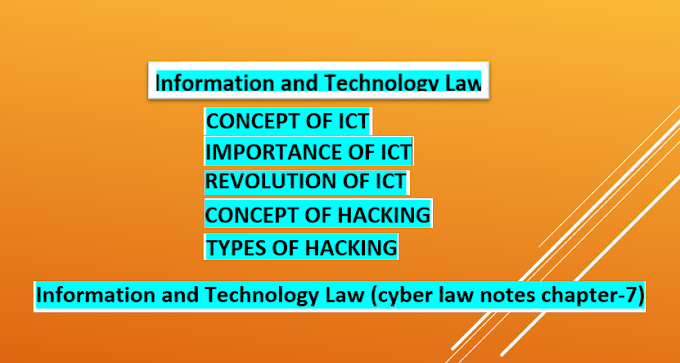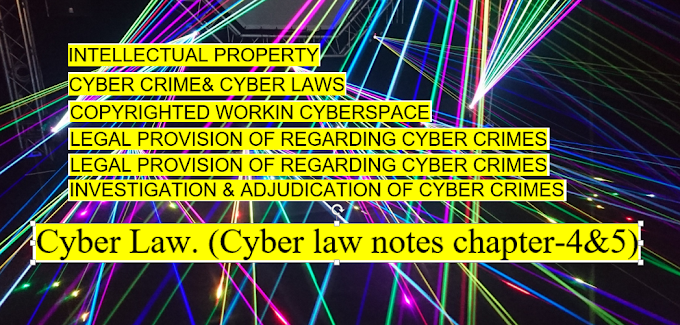CONCEPT OF E-COMMERCE:
E-Commerce refers to any form of business transaction
conducted online. The most popular example of E-Commerce is online shopping,
which is defined as buying and selling of goods via the internet on any device.
However, E-Commerce can also entail other types of activities, such as online
auctions. payment gateways, online ticketing, and internet banking.
E-Commerce is the fastest-growing retail market projected
to hit S4.135 trillion in sales in 2020.
Mobile commerce, or M-Commerce, is a rapidly growing new
avenue of E-Commerce that's mostly driven by the expanding market and influence
of smartphones and millennials' comfort with shopping online. In 2018, the M-Commerce
sector enjoyed a 39.19% increase in sales compared to the previous year.
What are the Different E-Commerce Business Models?
E-Commerce is typically classified into three different
models based on the type of participants involved in the transaction. Broadly
speaking these business models are:
Business to Business (B2B)
B2B is when businesses sell to other businesses. This is
typical of stationery stores wh0 sell office equipment in bulk to businesses.
Normally B2B companies provide a discounted rate per unit if customers buy in
bulk which it is great motivation for offices to avail of.
Business to consumer (B2C)
B2C is the most commonly thought of business model where
merchants sell to consumers who buy a small amount of produce. A familiar example
of the B2C model would be supermarkets where consumers buy their shopping
weekly but they wouldn't normally bulk buy anything.
Consumer to consumer (C2C)
C2C is a relatively new business model where consumers who
previously bought something seek to resell this item to another consumer.
Through marketplaces like eBay and Craigslist, this can be easy and quite
lucrative for selling items that you no longer have a use for.
E-COMMERCE IN BANGLADESH:
E-commerce involves buying and selling of products and
services by businesses and consumers through an electronic medium. Broadly,
e-commerce is classified into four categories: business to business or B2B
(Cisco), business to consumer or B2C (Amazon), consumer to consumer or C2C
(eBay) and Business-to-Government (B2G). (Business-to-business e-commerce
involves agreements between businesses and businesses. Distribution
management, inventory management, channel management, supplier management and
payment management are some of the areas in which B2B applications are widely
used. In Bangladesh, bgmea.com.bd, and bizbangladesh.com are examples of B2B
platforms.) (B2C commerce involves e-commerce between businesses and the
consumers. This form of e-commerce involves the purchase of books or any form
of consumer goods. It also includes the purchase of software, e-books, games, songs
as well as e-banking. ajkerdeal.com, bdbazar.com, daraz. com, bajna.com are
some examples of B2C) Advantages of B2C platforms to companies are reduced operating
costs, bigger outreach, globalization, customer convenience and knowledge management.
Consumer-to-consumer E-commerce involves transactions between individual consumers. For instance, online auctions,
peer-to-peer systems for money or file exchanges can be classified as forms of
C2C e-commerce. In Bangladesh bikroy.com, and clickbd.com are examples of C2C platforms)
B2G is usually used for licensing process; public purchasing and other government
operations. B2G e-commerce is rather insignificant when compared to the other
three forms. However, B2G can be one of the driving forces for running the
public sector known as e-governance.
A wide range of technologies is used in e-commerce that
including electronic data interchange (EDI), electronic mail (e-mail), and electronic funds transfer (EFT). In case of Electronic Data Interchange (EDI), there needs to be an agreement between trading partners. EDI is a standard method
for exchanging business data. E-mail and fax are also forms of EDI. In
Bangladesh small, medium and big enterprises have taken up e-business
platforms. When compared to developed countries, developing countries have a
higher potential for improving the business structure and raising productivity by
using e-commerce as a medium. M-Commerce
(Mobile Commerce) and F-Commerce (Facebook Commerce) are
very popular in today's e-business world. Over the years, the number of online
transactions has been on the rise. According to BTRC officials, the number of
internet subscribers in Bangladesh had crossed 80 million in 2017. At present, there are approximately 2,000 e-commerce sites and 50,000 Facebook-based
outlets delivering almost 30,000 products a day Currently, 80 percent of the
online sales are taking place in Dhaka, Chattogram and Gazipur.
THE PROMISING SIGNIFICANCE OF E-COMMERCE:
E-commerce or Electronic commerce is the buzzword of the
modern day. In simple terms, it's just buying and selling of products and
services through the internet. But in a broad sense, it includes the entire online
process of developing, marketing, selling, delivering, servicing and paying for
products and services. With the widespread usage of internet, the sphere of
e-commerce has widened dramatically.
Today E-commerce is an integral part of the business because
of various reasons like:
- · Ease of use
- · Accessibility all across the globe
- · Great variety & easy compassion of products from different vendors
- · Trusted payment channels
- · Shopping can be done sitting in the convenience of home shopping, hence it is less time-consuming.
It is therefore very important for any new entrepreneur to
understand the significance of E-Commerce and should know how to utilize this
tool for the growth and development of business.
So, whether you have an existing business or launching a
brand new business, whether the volume of your business is large or small, you
can always generate profit by demonstrating your products or services online,
thereby acquiring a large amount of viewer exposure. In concise, buying and
selling will result in profits and returns.
There are so many factors that make e-commerce to come to
the forefront in today's world. Saving precious time involved in business
transactions is really a prominent factor. Like for instance, net banking makes
it easy to carry out money and baking transactions in a breakneck speed as
compared to the real banking scenario. This asserts the fact that Ecommerce is
beneficial to both businesses and consumers wise as payment and documentation can
be completed with greater efficiency and reliability. Another important factor
determining the flow of whole business iS connectivity. Connectivity is very
important for both consumers and businesses. Ecommerce provides better
connectivity for all the potential candidates all over the globe, thus helping
in enhancing the business without any geographical barriers. From the viewpoint of the customer, Ecommerce is a good Platform for hassle-free shopping by
sitting in your home. The customer can browse through all the products and services
available and can review and compare the prices of similar products
available in the online space.
DIMENSIONS OF E-COMMERCE:
- · Market Models
- · Communication Protocols
- · Product Ontologies
- · Marketplace Visualizations
- · Personalization
- · Trust & Reputation
- · Privacy & Security
- · Payments & Transaction Processing RA
- · Intermediaries
- · Legal Issues
DIMENSIONS OF E-COMMERCE SECURITY:
Six Dimensions of Ecommerce Security
1. Integrity
We all have the one common question, whether we have
received the same data that the sender has sent: Now it is the duty of
integrity for the correctness of the information that has been transmitted or
received or displayed on a website over the internet.
Integrity can ensure that information on the internet has
not been altered in any way by an unauthorized party. It maintains the
consistency, accuracy, and trustworthiness of the information over its entire
life cycle.
2. Non-repudiation
Good business depends on both buyers and sellers. They must
not deny any facts or rules once they accept that there should not be any
repudiation.
Non-repudiation confirms whether the information sent between
the two parties was received or not. It ensures that the purchase cannot be denied
by the person who completed the transaction. In other words, it's an assurance
that anyone cannot deny the validity of a transaction.
Mostly non-repudiation uses a digital signature for online
transactions because no one can deny the authenticity of their signature on a
document.
3. Authenticity
In e-commerce, since both the customer and seller need to
trust each other, they must remain as who they are in real. Both the seller and
buyer must provide proof of their original identity so that the e-commerce transaction
can happen securely between them.
Every e-commerce site uses authenticity as a tool to ensure
the identity of the person over the internet. In e-commerce, fraudulent identity
and authentication are also possible, which makes identity a difficult process.
Some common ways to ensure a person's identity are for customer to log in using a
password.
4. Confidentiality
Confidentiality refers to protecting information from being
accessed by an unauthorized person on the internet. In other words, only the
people who are authorized can gain access to view or modify or use the
sensitive data of any customer or merchants.
According to Juniper Research, nearly 146 billion records
will be exposed by criminal data breaches between 2018 and 2023.
One confidentiality breach will be sniffing. It's a program
that steals all the important files of the company, individual identity or
email messages or personal reports of the internet user.
5. Privacy
Where confidentiality is a concern about the information
present during communication, privacy is concerned with personal details. In
general, privacy is used to control the usage of information by the customers
that they have given to the merchant.
According to Fortune, 1.16 billion email addresses and
passwords are exposed in 2019 through security breaches.
Privacy is a major threat to any online transaction or
internet user since personal information has been revealed and there is no way
back to disclose them.
6. Availability
Continuous availability of the data is the key to providing a
better customer experience in e-commerce. The continuous availability of the
e-commerce website increases online visibility, search engine rankings, and site
traffic. Data that is present on the website must be secured and available 24x7x
365 for the customer without downtime. If it is not, it will be difficult to
gain a competitive edge and survive in the digital world.
INTERNET BANKING IN BANGLADESH:
The world of banking is changing fast in this constantly
changing digitized environment where the demand of internet banking in the banking
sector has become mandatory as the customer demands to get the facilities of
banking at their fingertips. Paying bills, cell phone top-ups, transferring
funds, or even buying advance movie tickets- we nowadays seek through our
internet banking apps cause life has become hectic and busy. 2020 is predicted
to feature an even stronger collision of two worlds, the financial services,
and technology. Times many banks in our country have come up with their
own internet banking app to provide all the accompaniments that one customer
can obtain by using internet banking apps.







0 Comments